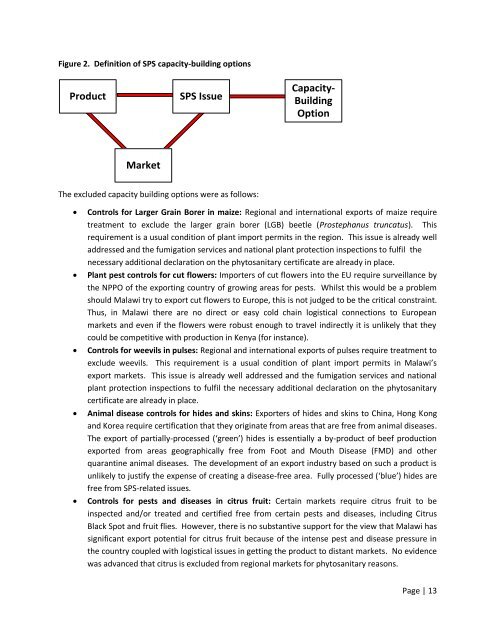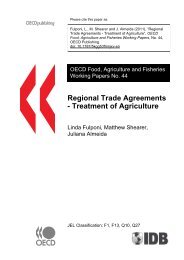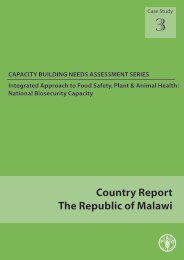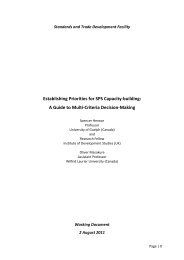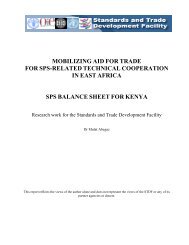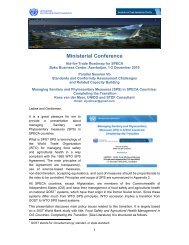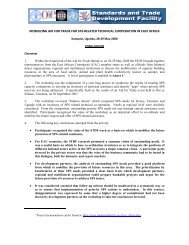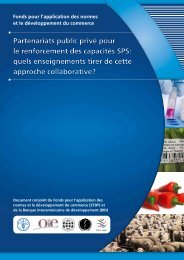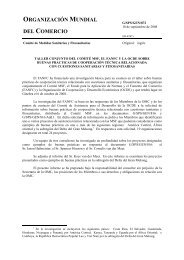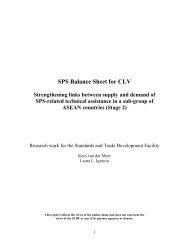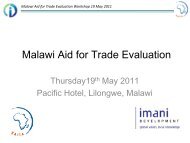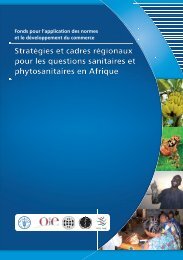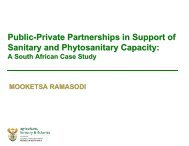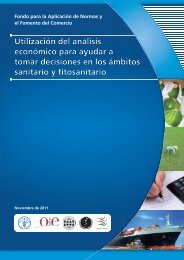MCDA Final Report Malawi - Standards and Trade Development ...
MCDA Final Report Malawi - Standards and Trade Development ...
MCDA Final Report Malawi - Standards and Trade Development ...
Create successful ePaper yourself
Turn your PDF publications into a flip-book with our unique Google optimized e-Paper software.
Figure 2. Definition of SPS capacity-building options<br />
Product<br />
SPS Issue<br />
Capacity-<br />
Building<br />
Option<br />
Market<br />
The excluded capacity building options were as follows:<br />
<br />
<br />
<br />
<br />
<br />
Controls for Larger Grain Borer in maize: Regional <strong>and</strong> international exports of maize require<br />
treatment to exclude the larger grain borer (LGB) beetle (Prostephanus truncatus). This<br />
requirement is a usual condition of plant import permits in the region. This issue is already well<br />
addressed <strong>and</strong> the fumigation services <strong>and</strong> national plant protection inspections to fulfil the<br />
necessary additional declaration on the phytosanitary certificate are already in place.<br />
Plant pest controls for cut flowers: Importers of cut flowers into the EU require surveillance by<br />
the NPPO of the exporting country of growing areas for pests. Whilst this would be a problem<br />
should <strong>Malawi</strong> try to export cut flowers to Europe, this is not judged to be the critical constraint.<br />
Thus, in <strong>Malawi</strong> there are no direct or easy cold chain logistical connections to European<br />
markets <strong>and</strong> even if the flowers were robust enough to travel indirectly it is unlikely that they<br />
could be competitive with production in Kenya (for instance).<br />
Controls for weevils in pulses: Regional <strong>and</strong> international exports of pulses require treatment to<br />
exclude weevils. This requirement is a usual condition of plant import permits in <strong>Malawi</strong>’s<br />
export markets. This issue is already well addressed <strong>and</strong> the fumigation services <strong>and</strong> national<br />
plant protection inspections to fulfil the necessary additional declaration on the phytosanitary<br />
certificate are already in place.<br />
Animal disease controls for hides <strong>and</strong> skins: Exporters of hides <strong>and</strong> skins to China, Hong Kong<br />
<strong>and</strong> Korea require certification that they originate from areas that are free from animal diseases.<br />
The export of partially-processed (‘green’) hides is essentially a by-product of beef production<br />
exported from areas geographically free from Foot <strong>and</strong> Mouth Disease (FMD) <strong>and</strong> other<br />
quarantine animal diseases. The development of an export industry based on such a product is<br />
unlikely to justify the expense of creating a disease-free area. Fully processed (‘blue’) hides are<br />
free from SPS-related issues.<br />
Controls for pests <strong>and</strong> diseases in citrus fruit: Certain markets require citrus fruit to be<br />
inspected <strong>and</strong>/or treated <strong>and</strong> certified free from certain pests <strong>and</strong> diseases, including Citrus<br />
Black Spot <strong>and</strong> fruit flies. However, there is no substantive support for the view that <strong>Malawi</strong> has<br />
significant export potential for citrus fruit because of the intense pest <strong>and</strong> disease pressure in<br />
the country coupled with logistical issues in getting the product to distant markets. No evidence<br />
was advanced that citrus is excluded from regional markets for phytosanitary reasons.<br />
Page | 13


